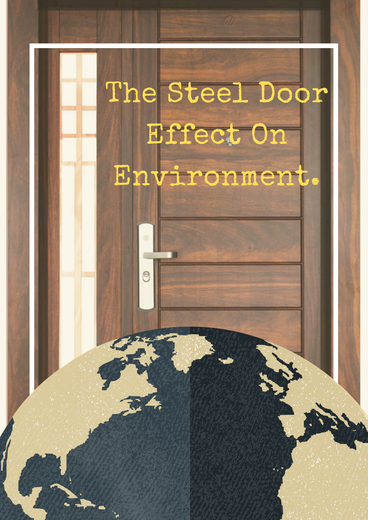



Did you know that switching to steel doors from wooden or fibreglass doors can reduce your environmental impact by 40%?
Every year on June 5, people around the world celebrate World Environment Day. It serves as the primary method used by the UN to promote environmental protection awareness and action.
Due to the epidemic, World Environment Day this year was uneventful with few programmes and efforts in India. However, we now stand at a crossroads of exciting future possibilities.
historically, steel doors in structures
In the Western world, steel or metal doors have been used in both residential and commercial structures for more than a century. Around the turn of the 20th century, some of the biggest manufacturers in the world were foundedBuilders preferred these doors because of their durability, low maintenance requirements, and long lifespan. As a result of significant investments made in Asia, manufacturers in Japan, South Korea, and even China can now produce more than one million doors annually.
These countries currently have a lot of residential highrises with steel doors for both domestic and commercial purposes. What needs to be secured, then, for steel doors to be a viable option to wood, chipboard, and plywood doors in our nation? And what can we infer from their experience about how government rules, taxes, and usage incentives have functioned as the main forces in these nations?
Like many national-scale projects, this one requires the support and involvement ofGovernment is a necessary and inevitable component of success. Therefore, in order for additional green initiatives like solar power, wind power, and electric cars to succeed, there needs to be active government involvement, laws, and financial incentives to promote usage and ensure that private investments flow in that direction.
In India, where the steel door industry is only a few decades old, certain application areas, like as fire safety and security, have seen tremendous growth. It has become popular in both private and public buildings in busy commercial locations. Recently, steel doors have become more popular in housing, healthcare, pharmaceuticals, and educational institutions. With Steel becoming a popular option among developers, architects, and decision-makers, we are on the verge of a new revolution. IF THIS TENDENCE
If this trend were to continue, it would have an enormously positive effect on the environment by preserving vast numbers of trees and forests and reducing the need to import lumber. Everyone will be able to see the favourable outcomes.
What could possibly halt this march?
Since 2018, there has been some pushback to the globalisation wave as several nations impose import restrictions and import charges on particular materials and products to safeguard their own industries from potential closure. Although this apparent protective stance toward local industry appears to be beneficial, the unintended result is higher local raw material prices, which hurt downstream industries including steel, in part because the "protection" also subsidises local players' inefficiencies and restricts the import of cheaper raw materials.
This also applies to India, where steel imports have tariff barriers put in place, allowing local players to raise prices to a point where the bulk of downstream businesses are suffering and they become unworkable.
The Covid-19 pandemic has made matters worse, with price increases that have reached historical highs of 50% over the previous years. As a result, traditional materials are now more expensive than steel items, such as doors, which inhibits the expansion of this emerging business.
What steps may be taken to save this sector?
The highest slab of GST rates for steel doors is 18%!
Although the author does not support zero taxation, a more tolerant taxing system that starts at, say, 5 percent and gradually increases the rate based on the business's maturity will make this a sustainable industry with the capacity tohave tariff barriers put in place, allowing local players to raise prices to a point where the bulk of downstream businesses are suffering and they become unworkable.
The Covid-19 pandemic has made matters worse, with price increases that have reached historical highs of 50% over the previous years. As a result, traditional materials are now more expensive than steel items, such as doors, which inhibits the expansion of this emerging business.